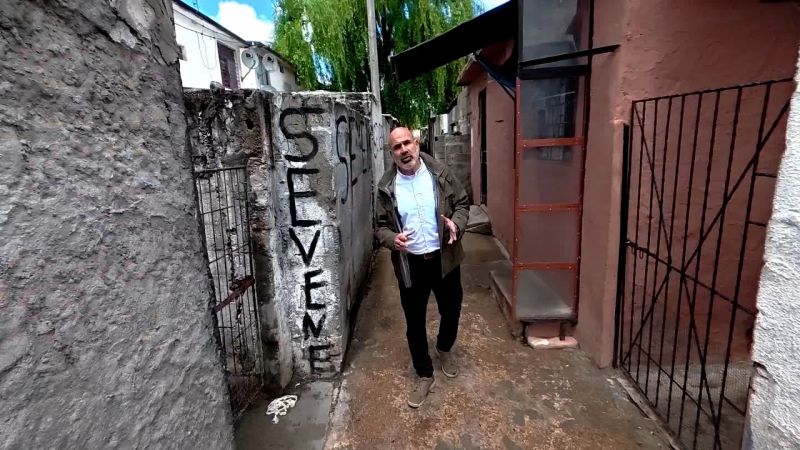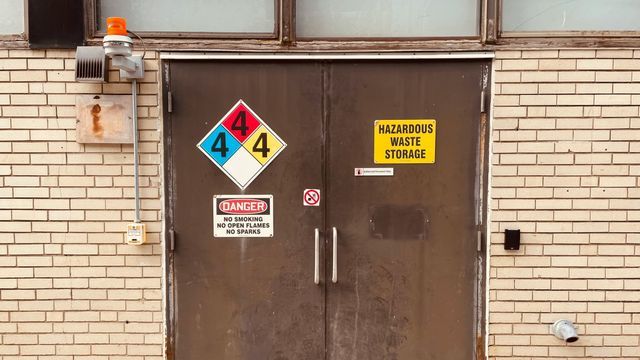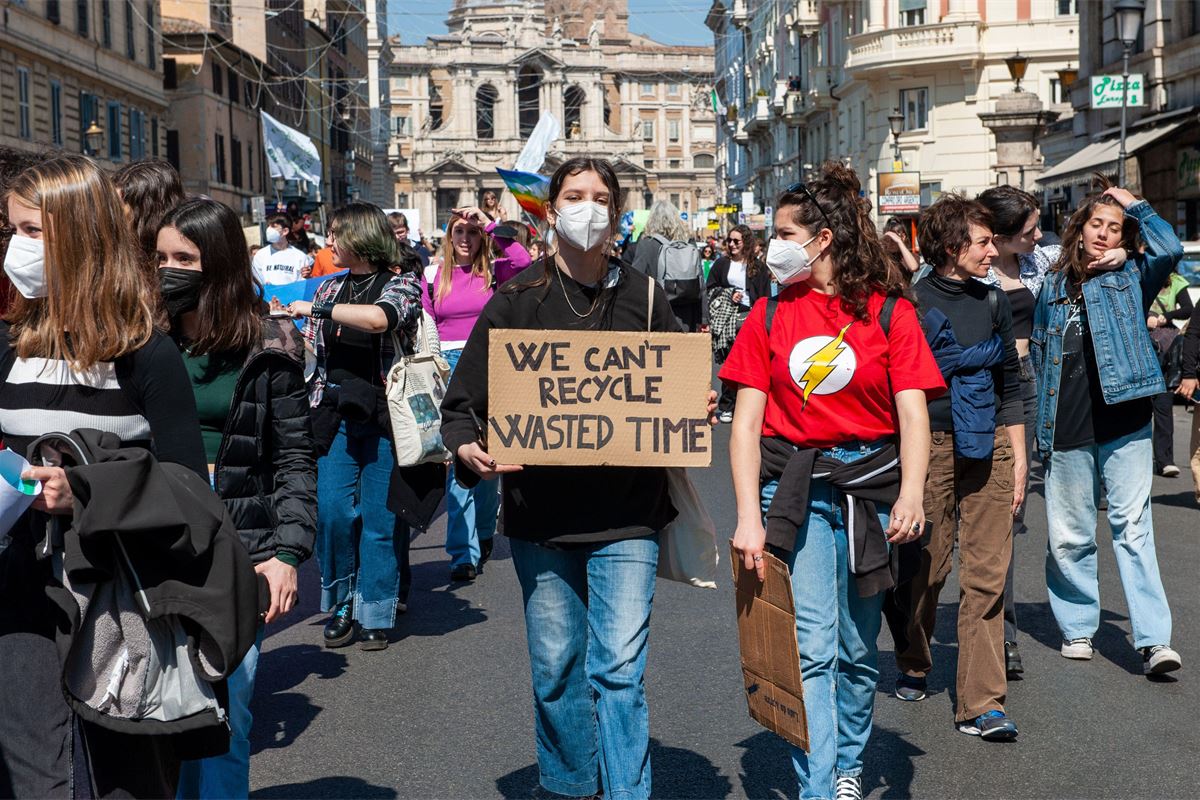Ukrainian government raids anti-corruption campaigner, raising alarm – NBC News

Report on Challenges to Sustainable Development Goal 16 in Ukraine: Corruption and Institutional Integrity
Introduction: Threats to SDG 16 – Peace, Justice and Strong Institutions
Recent events in Ukraine have raised significant concerns among activists regarding the nation’s commitment to Sustainable Development Goal 16 (SDG 16), which promotes peaceful and inclusive societies, provides access to justice for all, and builds effective, accountable, and inclusive institutions. Reports of police actions against a prominent anti-corruption advocate and opposition figures suggest a potential regression in efforts to achieve key SDG 16 targets, particularly those related to reducing corruption and ensuring the rule of law.
Case Study: The Arrest of Anti-Corruption Activist Vitaliy Shabunin
The case of Vitaliy Shabunin, co-founder of the Anti-Corruption Action Center, exemplifies the current challenges to Ukraine’s institutional integrity and its adherence to SDG 16. The developments undermine progress on several targets:
- SDG 16.5 (Substantially reduce corruption): Shabunin has accused President Volodymyr Zelenskyy’s administration of actions that contravene this goal, including backing laws that could offer amnesty for corruption within the defense industry.
- SDG 16.3 (Promote the rule of law): On July 11, armed police raided Shabunin’s home. His organization alleges the State Bureau of Investigations lacked the necessary court documents for the search, representing a direct challenge to the rule of law.
- SDG 16.10 (Protect fundamental freedoms): Shabunin was charged with evading military service and fraud. However, his supporters and a coalition of civil society organizations contend the charges are politically motivated and constitute a deliberate attack to pressure a government critic, thereby threatening fundamental freedoms.
Institutional Response and Civil Society Concerns
The response from domestic and international civil society highlights a perceived erosion of democratic principles and institutional accountability, central tenets of SDG 16.
- Violation of Due Process: Daria Kaleniuk, executive director of the Anti-Corruption Action Center, described the raid as crossing a “red line” and a move in the “wrong direction” for Ukraine’s development, specifically citing the lack of proper judicial authorization. This points to a weakening of SDG 16.6 (effective, accountable institutions).
- Widespread Condemnation: A coalition of 59 non-governmental organizations signed an open letter asserting that Shabunin’s arrest “bears signs of political motivation, abuse of rights,” and reflects either “gross incompetence” or a targeted pressure campaign.
- Erosion of Democratic Values: The German Marshall Fund, a signatory to the letter, stated that targeting vocal critics with “flimsy charges” shows an “alarming disregard for the fundamental values of freedom and the rule of law,” which are foundational to achieving SDG 16.
- Pattern of Pressure: The opposition UDAR party reported a similar raid on one of its officials, suggesting a potential pattern of suppressing dissent that undermines SDG 16.7 (responsive, inclusive, participatory and representative decision-making).
Broader Implications for National Progress and International Partnerships (SDG 17)
These developments have broader implications for Ukraine’s long-term stability and its ability to form effective partnerships for sustainable development, as outlined in SDG 17.
- National Anti-Corruption Agenda: While President Zelenskyy has made progress on his 2019 pledge to combat corruption, and Ukraine has improved on Transparency International’s Corruption Perceptions Index, recent events risk undermining these gains and public trust in state institutions.
- Politicization of Corruption: The issue of corruption is highly sensitive and is often politicized by both adversaries and partners, complicating efforts to build strong international alliances (SDG 17) based on shared values of transparency and accountability.
- Role of International Partners: Activists express concern that key international partners, such as the United States, may be reducing their focus on good governance and anti-corruption reforms. A decline in international pressure could weaken the framework of SDG 16.a, which calls for strengthening national institutions through international cooperation.
Conclusion: The Imperative of Upholding SDG 16 for Sustainable Peace
The ongoing situation presents a critical test for Ukraine’s democratic resilience and its commitment to the 2030 Agenda for Sustainable Development. The actions against anti-corruption figures and political opposition directly threaten the core principles of SDG 16. Upholding the rule of law, protecting fundamental freedoms, and ensuring the development of accountable institutions are not only essential for achieving sustainable peace and justice but are also fundamental to the values Ukraine seeks to defend. As stated by Daria Kaleniuk, the fight is for “freedoms and for dignity”; a failure to protect these values domestically would represent a significant setback for the nation’s sustainable development path.
SDGs Addressed in the Article
SDG 16: Peace, Justice, and Strong Institutions
- The article extensively discusses issues central to SDG 16, focusing on Ukraine’s “endemic corruption problem,” the state of the rule of law, the effectiveness and accountability of government institutions, and the protection of fundamental freedoms for activists and opposition figures. The core conflict described is the tension between the government’s actions and the principles of good governance, transparency, and justice, which are the cornerstones of this goal.
Specific SDG Targets Identified
-
Target 16.5: Substantially reduce corruption and bribery in all their forms
- The article opens by stating that “Ukraine risks backsliding on its endemic corruption problem.” It mentions President Zelenskyy’s 2019 pledge to “reduce corruption” and highlights the work of the “Anti-Corruption Action Center.” The narrative also points to potential corruption in the defense industry, where the president is accused of “backing laws offering amnesty to those accused of corruption.”
-
Target 16.6: Develop effective, accountable and transparent institutions at all levels
- Concerns about institutional integrity are raised throughout the article. Activists accuse President Zelenskyy of “taking the first, but confident steps toward corrupt authoritarianism” and “passing over an independently selected candidate for a key anti-graft role.” The actions of the State Bureau of Investigations, which allegedly conducted raids “without the necessary court documents,” point to a lack of accountability and transparency within state institutions. The German Marshall Fund also expresses concern about a “disregard for the fundamental values of freedom and the rule of law.”
-
Target 16.3: Promote the rule of law at the national and international levels and ensure equal access to justice for all
- The article details actions that undermine the rule of law. The police raid on anti-corruption campaigner Vitaliy Shabunin’s home and the subsequent charges of evading military service are described by his supporters as “trumped up and political.” Similarly, a raid on an opposition party member’s home was seen as an “attempt to put pressure on political dissent.” These events suggest that the legal system is being used for political purposes rather than to ensure equal justice.
-
Target 16.10: Ensure public access to information and protect fundamental freedoms, in accordance with national legislation and international agreements
- The core of the article is the crackdown on an anti-corruption campaigner and opposition figures, which represents a direct threat to fundamental freedoms, particularly the freedom of expression and association for civil society. The article notes that the government is “targeting its vocal critics with flimsy charges in politically motivated investigations.” The open letter signed by 59 nongovernmental and civil society organizations protesting Shabunin’s arrest underscores the importance of protecting these freedoms.
Indicators for Measuring Progress
-
Indicator for Target 16.5: Corruption Perceptions Index
- The article explicitly mentions an indicator used to measure corruption levels. It states that “Transparency International, the best known international group that tracks this topic, says Ukraine has steadily improved in its annual ‘Corruption Perceptions’ index — although it still ranks 105 of 180 countries worldwide.” This provides a quantifiable measure of perceived public sector corruption.
-
Implied Indicator for Target 16.3 & 16.10: Number of politically motivated investigations and arrests of civil society members and opposition figures
- The article does not name a specific indicator, but it implies one through its detailed reporting on the cases of Vitaliy Shabunin and Dmytro Bilotserkivets. The events described—police raids, “flimsy charges,” and arrests that “bear signs of political motivation”—can be tracked as data points. An increase in such cases would indicate a backsliding on the rule of law and the protection of fundamental freedoms. The open letter from 59 NGOs serves as evidence of such incidents being monitored by civil society.
-
Implied Indicator for Target 16.6: Public and civil society perception of institutional accountability
- The article implies this indicator through the voices of activists and organizations. Daria Kaleniuk of the Anti-Corruption Action Center states that President Zelenskyy has “crossed… a very wrong direction in terms of the development of Ukraine.” Josh Rudolph of the German Marshall Fund notes an “alarming disregard for the fundamental values of freedom and the rule of law.” These qualitative assessments from watchdog groups reflect the perceived level of accountability and transparency of government institutions.
SDGs, Targets, and Indicators Analysis
| SDGs | Targets | Indicators |
|---|---|---|
| SDG 16: Peace, Justice, and Strong Institutions | 16.5: Substantially reduce corruption and bribery in all their forms. | Explicitly Mentioned: The Transparency International “Corruption Perceptions” index, where Ukraine ranks 105 out of 180 countries. |
| SDG 16: Peace, Justice, and Strong Institutions | 16.6: Develop effective, accountable and transparent institutions at all levels. | Implied: Public and civil society perception of institutional accountability, as voiced by the Anti-Corruption Action Center and the German Marshall Fund regarding actions like passing over independent candidates and a general “disregard for the fundamental values.” |
| SDG 16: Peace, Justice, and Strong Institutions | 16.3: Promote the rule of law at the national and international levels and ensure equal access to justice for all. | Implied: Number of verified cases of politically motivated investigations, evidenced by the “trumped up and political” charges against Vitaliy Shabunin and the raid on Dmytro Bilotserkivets’ home. |
| SDG 16: Peace, Justice, and Strong Institutions | 16.10: Ensure public access to information and protect fundamental freedoms. | Implied: Number of verified cases of attacks on or harassment of civil society activists, as exemplified by the police raid on Vitaliy Shabunin and the government “targeting its vocal critics.” |
Source: nbcnews.com

What is Your Reaction?
 Like
0
Like
0
 Dislike
0
Dislike
0
 Love
0
Love
0
 Funny
0
Funny
0
 Angry
0
Angry
0
 Sad
0
Sad
0
 Wow
0
Wow
0









































































